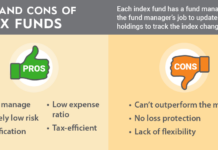
If you have started your investment journey, you already have a few investing avenues- like mutual and index funds. Today we will focus on index funds, and are they a good investment choice for a beginner?
To start, index funds are a form of Exchange Traded Funds (ETF) or Mutual Funds that are designed to track a particular index. The index fund will contain stocks or bonds in that specified index, like the Dow Jones Industrial Average or the S&P 500, and tries to earn the same returns as the index at a low cost.
The biggest question as an investor is whether index funds are a fit for you. Answering this question requires you to read more on index funds’ pros and cons and how to choose the right index fund.
Pros and Cons of Index Funds
Pros
- Reliable performance – with an index fund, one is assured of a return the same as the index, less the management costs. Index funds have had higher returns than actively managed funds in the past. In his book, The Little Book of Common Sense Investing, John C. Bogle, the inventor of index funds and founder of Vanguard, advises investors to focus on index funds rather than trying to beat the market.
- Low costs – index funds are passively managed, meaning the composition of its assets rarely changes. That leads to lower costs from trading and taxes for you as an investor. The average expense of an actively managed fund is 1.3% or so, while the average cost of managing an index fund ranges at 0.2% or lower.
- Diversification – the secret to a great investment portfolio lies in diversification. By diversifying, you are trying to minimize your risks while managing to maximize your gains. An index fund is one of the best diversification avenues since it contains various stocks or bonds from different companies, compared to buying individual company stocks.
- Transparent – since index funds hold assets the index, an investor can see what the fund holds at any time. It is much easier to judge the performance of a fund when you can see what it holds.
Cons
- No flexibility – since an index fund aims to track a benchmark, the fund has little to no flexibility for the manager to change the composition of the underlying assets, even when the market index is performing poorly.
- It doesn’t outperform the market index – due to the lack of flexibility, index funds rarely beat the market index they are tracking. While you’re guaranteed a return, a loss is also guaranteed when the index loses.
- Tracking error – this is the difference between the index fund return and the benchmark’s return. Tracking error reflects the cost of running the portfolio, and index funds with a low tracking error are the best choice.
How to Choose The Best Index Fund
- Investment horizon – how much time do you want to retain your investment portfolio? The index fund’s underlying assets need to reflect your time horizon, depending on whether you have a short or long term investment time horizon.
- Risk tolerance – how much risk are you willing to take to earn a return from the index fund. With this, you can consider how much risk is associated with the index fund. Does it match your risk tolerance?
- Expenses – how much trading costs, commission, or other fees does the fund charge. Compare the fees across different index funds in the same sector for a more precise cost rate.
- The performance of the fund needs to mirror the market index in its performance over an extended period. This is the best way to know whether the index fund is performing or not.
Investing in index funds is good for investors of all types, whether you are just starting your investment journey or not. It offers an investor an opportunity to track a market index effortlessly without incurring more management costs or research time trying to beat the benchmark. But, if you are willing to take on higher risks for higher returns than the benchmark, index funds might not be the best investment avenues for you.











